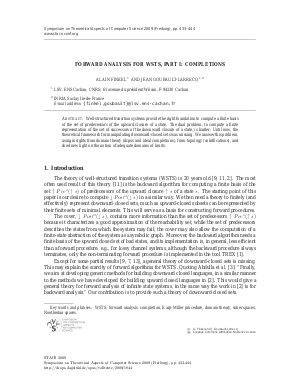Forward Analysis for WSTS, Part I: Completions
Authors Alain Finkel, Jean Goubault-Larrecq
-
Part of:
Volume:
26th International Symposium on Theoretical Aspects of Computer Science (STACS 2009)
Part of: Series: Leibniz International Proceedings in Informatics (LIPIcs)
Part of: Conference: Symposium on Theoretical Aspects of Computer Science (STACS) - License:
 Creative Commons Attribution-NoDerivs 3.0 Unported license
Creative Commons Attribution-NoDerivs 3.0 Unported license
- Publication Date: 2009-02-19
File

PDF
LIPIcs.STACS.2009.1844.pdf
- Filesize: 158 kB
- 12 pages
Document Identifiers
Subject Classification
Keywords
- WSTS
- Forward analysis
- Completion
- Karp-Miller procedure
- Domain theory
- Sober spaces
- Noetherian spaces
Metrics
- Access Statistics
-
Total Accesses (updated on a weekly basis)
0PDF Downloads0Metadata Views
Abstract
Well-structured transition systems provide the right foundation to compute a finite basis of the set of predecessors of the upward closure of a state. The dual problem, to compute a finite representation of the set of successors of the downward closure of a state, is harder: Until now, the theoretical framework for manipulating downward-closed sets was missing. We answer this problem, using insights from domain theory (dcpos and ideal completions), from topology (sobrifications), and shed new light on the notion of adequate domains of limits.
Cite As Get BibTex
Alain Finkel and Jean Goubault-Larrecq. Forward Analysis for WSTS, Part I: Completions. In 26th International Symposium on Theoretical Aspects of Computer Science. Leibniz International Proceedings in Informatics (LIPIcs), Volume 3, pp. 433-444, Schloss Dagstuhl – Leibniz-Zentrum für Informatik (2009)
https://doi.org/10.4230/LIPIcs.STACS.2009.1844
BibTex
@InProceedings{finkel_et_al:LIPIcs.STACS.2009.1844,
author = {Finkel, Alain and Goubault-Larrecq, Jean},
title = {{Forward Analysis for WSTS, Part I: Completions}},
booktitle = {26th International Symposium on Theoretical Aspects of Computer Science},
pages = {433--444},
series = {Leibniz International Proceedings in Informatics (LIPIcs)},
ISBN = {978-3-939897-09-5},
ISSN = {1868-8969},
year = {2009},
volume = {3},
editor = {Albers, Susanne and Marion, Jean-Yves},
publisher = {Schloss Dagstuhl -- Leibniz-Zentrum f{\"u}r Informatik},
address = {Dagstuhl, Germany},
URL = {https://drops.dagstuhl.de/entities/document/10.4230/LIPIcs.STACS.2009.1844},
URN = {urn:nbn:de:0030-drops-18444},
doi = {10.4230/LIPIcs.STACS.2009.1844},
annote = {Keywords: WSTS, Forward analysis, Completion, Karp-Miller procedure, Domain theory, Sober spaces, Noetherian spaces}
}
